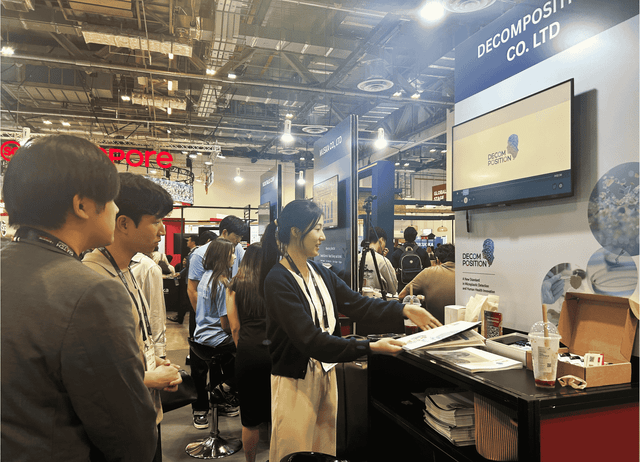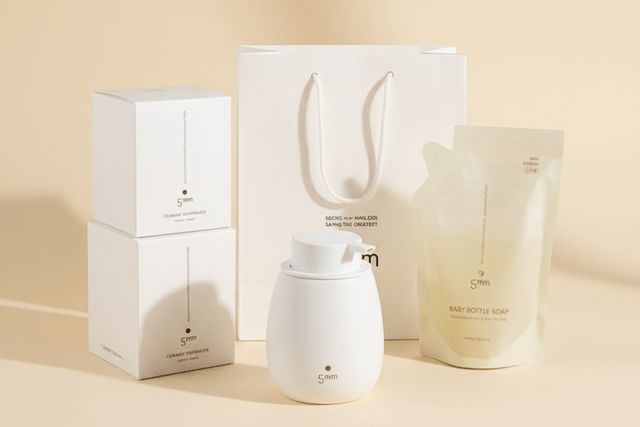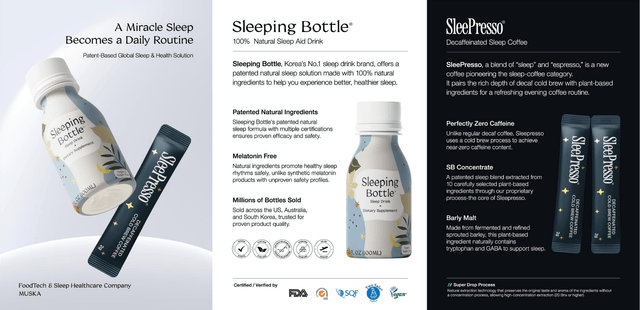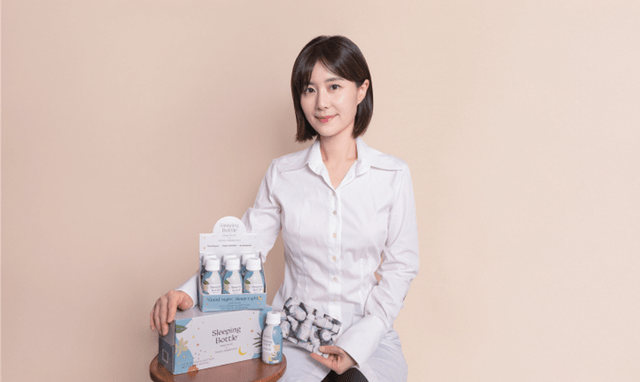Partner content in association with
From dissolving microplastics to tackling insomnia, South Korea’s startups take on the world’s biggest problems
While South Korean consumer and auto brands have long enjoyed global stature, a new wave of startups has set their sights on worldwide domination, powered by innovative business models and bespoke solutions to some of the 21st century’s most pressing problems.
At the recently held Switch (Singapore Week of Innovation and Technology) 2025, some of the best global startup talent was showcased from markets as distant and diverse as Brazil and Taiwan.
However, even amid a dazzling lineup of innovative ideas and concepts, the firms at the K-startup pavilion from the Korea Institute of Startup and Entrepreneurship Development (KISED) stood out for their ambitious goals and global focus. Rather than becoming over-reliant on the domestic market, some of these firms, like foodtech and sleep healthcare startup Muska Co, are already clocking in revenue from key global geographies. Other firms have set themselves challenging targets in difficult, diverse areas, including brain health and the reduction of microplastics.
We spoke to two of these firms on the sidelines of Switch 2025 to get a deeper insight into their business models, fundraising targets, and global ambitions.
Decomposition Co is taking on the hazard of microplastics: The journey so far
Over the last decade, there has been ample evidence around the ubiquity of microplastics. According to the World Economic Forum, microplastics are present across the environment, in food chains, and even within human bodies. Studies have linked them to an increased risk of heart attack, stroke, or Alzheimer’s. Detecting and eliminating microplastics has traditionally been expensive.

This is where South Korea-headquartered Decomposition steps in. The firm was founded at the Handong Global University in Pohang, South Korea. The founding team was working on plastic degrading microbes and became very concerned about the impact of microplastics.
Decomposition has created a full-cycle solution for its detection and removal. R&D director Lina Jeong said, “We have developed a biochemical sensor-based detection kit and are working on natural compounds that can absorb, remove and even biodegrade microplastics, both within and outside the body.”

The firm is focusing on both the consumer and the B2B segment. For consumers, Decomposition offers an edible to eliminate internal microplastics, while a dish soap keeps these pollutants away from external contact.

5mm is a brand that develops sanitation products and foods effective for microplastic removal, utilising plastic-degrading microorganisms. It represents Decomposition’s consumer segment items. The photo above is of the company’s specialised baby bottle cleanser for microplastic removal.
The B2B part of the business offers detection services and is used by agriculture or consumer goods companies that want microplastic-free certification for their products. Jeong said, “We are working with government projects that monitor and manage microplastic levels in the lifecycle of aquaculture.”
The company’s first microplastic detection kit is now in use and it is preparing to launch an MVP for a consumable microplastic removal formulation.
Decomposition’s fundraising milestones and goals
Decomposition secured $150,000 in a seed round from CNTTECH. The firm has also received grants for R&D and commercialisation from the government of South Korea. Some of these include a selection in Yuhan Kimberley’s green impact fund programme, an excellence prize and G star dreamer selection from the Gyeongbuk Centre for Creative Economy and Innovation and a selection for the Ministry of Environment’s Eco-Startup programme.
Decomposition aims to raise a pre-A round of 1.5 billion KRW ($1 million). The funds will be deployed towards strengthening its specialised detection platform, scaling production, marketing, and expanding the team with new hires in R&D and operations.
Europe has been earmarked for geographic expansion, considering its strict environmental regulations around microplastics and health-related policies. Jeong says, “We are trying to find European partners to set up a regional hub. Our goal is to offer cost-efficient and reliable microplastic detection services and products through local collaborations.”
The competitive environment
Microplastic contamination has attracted several startups the world over. However, Jeong believes her firm has an edge and says, “Traditionally, microplastics were analysed using FT-IR microscopes or pyrolysis GC-MS systems that are expensive and time-consuming. We took a completely different route. We use microbial enzyme mixers that break plastics down and detect them through fluorescence. This method cuts down the cost by over 90% while achieving 20% higher accuracy than conventional instruments. Our approach can handle up to 100 samples at once. We offer affordable, user-friendly, nano-level detection solutions for the public.”
The vision
Over the remainder of this decade, Decomposition will focus on detection and removal of microplastics in the industrial and environmental sector, with a roadmap to move into the healthcare space. The company aims to measure these contaminants in blood and urine samples, besides obtaining medical approval for its removal compounds. Jeong says, “In 10 years, we aim to become a global leader in microplastics healthcare, starting from Europe. We want to issue a certification mark which will be displayed everywhere from hospitals to restaurants, so that customers can recognise and trust an establishment.”
Muska Ltd.’s vision of melatonin-free sleep solutions for all: The journey so far
Muska, a foodtech startup specialising in sleep healthcare, emerged from the personal journey of its CEO and founder, Jesse Kim.
An entrepreneur and restaurateur, Kim found herself racked by insomnia as she managed multiple professional and personal responsibilities. While addressing her sleeplessness, she became aware of the long-term impacts of prescription medication, as well as the ill effects of melatonin-based solutions, which are the industry standard in many countries, like the United States, for OTC remedies.
Leveraging on her experience in the food industry, Kim arrived at a natural ingredient mix to induce sleep. She says, “We developed melatonin-free and plant-based sleep beverages such as Sleeping Bottle and SleePresso. Our mission is to redefine daily balance through natural sleep solutions, backed by patented technologies.”
The brand achieved remarkable success in South Korea, becoming the No.1 best-selling inner beauty food product at Olive Young, the nation’s largest and most influential health & beauty drugstore.

Kim adopted several innovative strategies to promote her products, including forming partnerships with industries where quality sleep is highly valued, such as the hospitality sector and healthcare.
At the Hyatt Group, Muska’s products are featured in co-branded wellness initiatives, including luxury spa and relaxation services, as well as customised sleep kits.
Muska has also established a strategic partnership with Severance Health Check-up Center, a prestigious health screening facility operated by Yonsei University Health System, to deliver comprehensive health screening services and expert consultations. As the brand expands globally, Kim plans to leverage these connections to increase brand visibility and promote its suite of solutions.
The company has registered over a million dollars in sales so far. While 70% of the business comes from South Korea, Muska is already engaged in global expansion, using Singapore as a base. Priority markets include the United States, Australia, and Singapore. The popularity of its solutions has also been buoyed by the soft power around Korea with growing global affinity for the country’s cuisine and pop culture. The universal applicability of the product which is popular with youngsters who miss out on sleep due to an active lifestyle, and the elderly who suffer from insomnia is yet another factor contributing to its adoption.

Muska’s fundraising milestones and goals
Muska was part of the K Startup Center program last year, supported by the Ministry of SMEs, which helped the company make its foray into the United States. Its seed funding stands at under $1 million. For its next round, Muska hopes to secure $5 million. The focus after funding will be on global expansion, regulatory compliance, R&D for new product formats, clinical validation and overseas marketing. Another key priority is partnerships and supply chain scalability.
The competitive environment
Most of the competition in the OTC space is melatonin-based products. Besides, there being mounting concerns around melatonin as an ingredient; it is classed as a prescription drug in Korea. With an increasing number of consumers looking for melatonin-free alternatives or vegan and sugar-free options, Muska’s portfolio is poised to grow.
The vision
Muska’s long-term ambitions include becoming a globally recognised presence in the space of sleep lifestyle. Kim sees its product suite expand beyond consumable sleep solutions to include clothes, bedding, and even music and a worldwide content platform. She says, “By 2030, we aim to be a global wellness brand that inspires healthier, more sustainable routines — starting with sleep but extending to every aspect of daily recovery and balance. Our vision is to make ‘well-life’ accessible, natural, and meaningful for everyone.”
Singapore is emerging as a catalyst for South Korean tech firms seeking regional growth
Switch 2025 underscored a clear trend: Singapore is solidifying its role as the critical launching pad for South Korean deep tech into the vibrant markets of Southeast Asia.
Korean government support — spearheaded by KISED — drove a significant delegation to SWITCH, demonstrating a sharp focus on regional expansion. Muska and Decomposition were part of a 31-strong KISED contingent, marking the largest showing since 2022.
This surge is not accidental. Data from KISED reveals that over 100 Korean companies have established a presence in Singapore over the past five years. This phenomenon is driven by two main factors: Singapore’s established reputation as a stable, global business hub and the intense domestic competition in South Korea, which forces highly skilled startups to seek opportunities abroad. Korean startups are known for their strong R&D capabilities and agility, which makes them strategically positioned to capitalise on international markets.
For Southeast Asian partners and investors, this collaboration brings tangible benefits beyond market entry. It provides access to battle-tested, high-quality technology — ranging from innovative solutions to improve mobility rights to next-generation AI-integrated hardware — ready to be customised for local operational and logistical challenges.
Ultimately, the goal of this sustained effort is to leverage Singapore’s strategic position to foster a mutual growth ecosystem. By positioning Singapore as the primary bridgehead, KISED aims to accelerate long-term investment and cross-border partnerships that benefit both South Korea’s advanced innovation sector and the rapidly expanding tech landscape of Southeast Asia.

